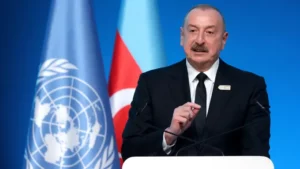The opening of COP29 in Baku, Azerbaijan, was marked by Azerbaijani President Ilham Aliyev’s controversial defense of oil and gas as “a gift from God.” His remarks, coupled with criticism of Western nations and NGOs, underscore the complex intersection of climate politics, geopolitics, and energy economics. For Africa, these discussions are not abstract; they directly impact the continent’s future, where the realities of climate vulnerability, resource dependency, and the need for global solidarity intersect.

Africa’s role in global climate negotiations remains paradoxical: the continent’s voice is often marginalized, yet it possesses immense potential to lead in producing and manufacturing its own resources while tackling the adverse effects of climate change. Africa’s participation in forums like COP29 underscores an ongoing fight for equitable representation and recognition in shaping the global climate agenda.
It is time to challenge the outdated narrative of Africa as a continent of poverty and hunger; a stereotype that has long undermined its position in world-leading negotiations. Africa is rich in natural resources, innovation, and human capital, with the capability to offer solutions to the global climate crisis. Its renewable energy potential, from solar to wind, positions the continent as a critical player in the global transition to green economies.
By amplifying its voice and leveraging its resources strategically, Africa can redefine its role in climate talks, not as a victim, but as a leader advocating for justice, equity, and sustainable development. The global stage must recognize this transformation and engage Africa as a key partner in building a resilient and climate-smart future for all. Despite being among the least contributors to global greenhouse gas emissions, African nations bear the brunt of climate change effects, such as droughts, floods, and desertification. Countries like DRC and Mozambique, for example, grapple with these climate-induced challenges while receiving limited compensation or support for adaptation and mitigation efforts.
In this case, Aliyev’s framing of fossil fuels as divine gifts mirrors narratives in some African nations, where oil and gas are seen as drivers of development. However, this perspective contrasts sharply with the lived reality of communities displaced by oil exploration or suffering from environmental degradation, think about the EACOP project that has already displaced hundreds of people. The challenge lies in balancing resource utilization with sustainable development, a tension mirrored in African nations like Nigeria, where oil wealth has not translated into broad-based economic stability or climate resilience.
The geopolitical tensions at COP29 serves as a lesson for Africa. Aliyev’s accusations against France and the Netherlands, reflect the fraught nature of global climate negotiations. These divisions could undermine collective progress, something Africa cannot allow. As the world’s most climate-vulnerable region, African nations require a cohesive global framework that prioritizes their needs for financing, technology transfer, and capacity building.
Moreover, the withdrawal of Argentina’s delegation amidst domestic political shifts is a cautionary tale. Africa, too, faces internal political dynamics that can disrupt climate agendas. For example, countries like South Africa, which depend heavily on coal, have struggled to align domestic interests with international commitments. African nations must ensure that their climate strategies are resilient to political changes while maintaining their commitment to global goals like the Paris Agreement.
COP29 marks the third consecutive year the summit has been held in a petrostate, following the UAE and Egypt. This choice has drawn criticism for conflicting interests, as these nations’ economies heavily depend on fossil fuels. For African states, this raises important questions: How can resource-rich countries like Nigeria, Angola, or Algeria transition to green economies without compromising their economic stability?
The answer lies in leveraging international climate financing to diversify economies. Africa’s vast renewable energy potential; such as solar and wind can become a cornerstone of its development strategy. However, the continent requires genuine partnerships and investments from global powers to make this transition feasible. Achieving this potential requires substantial climate finance to support adaptation, mitigation, and a just energy transition. Africa continues to receive only a fraction of the global climate finance pledged, despite bearing the brunt of climate impacts. The continent must demand fair access to these funds and ensure that they are channeled effectively to build resilience, develop green infrastructure, and empower local communities
President Aliyev’s comments criticizing Western nations for “hypocrisy” resonate with African leaders who often argue that historical emitters in the Global North should bear greater responsibility for climate action. African nations have long called for loss and damage funding, emphasizing that justice requires addressing the disproportionate burdens placed on the Global South. Yet, African leaders must also hold themselves accountable by ensuring transparency and equitable distribution of climate funds. Corruption, poor governance, and lack of political will remain significant barriers to effective climate action within the continent. If we need change, we must steer clear of the notion that “Africa is poor”, Africa holds solutions to global problems.



The COP29 chaos depicts the urgent need for Africa to present a united front. The African Group of Negotiators (AGN) must push for the implementation of mechanisms that address the continent’s specific challenges, including adaptation, renewable energy investments, and just transition frameworks. Africa’s perspective offers a moral imperative: as the world debates the future of oil and gas, the voices of the most vulnerable must take center stage. Climate action must not only mitigate risks but also uplift communities, ensuring that no one is left behind in the pursuit of a sustainable future.
Ultimately, Africa’s message to COP29 and beyond is clear: In the spirit of “UBUNTU” , solidarity and justice must be the pillars of global climate negotiations, or the world risks deepening the divide between rhetoric and reality.








Leave a Reply